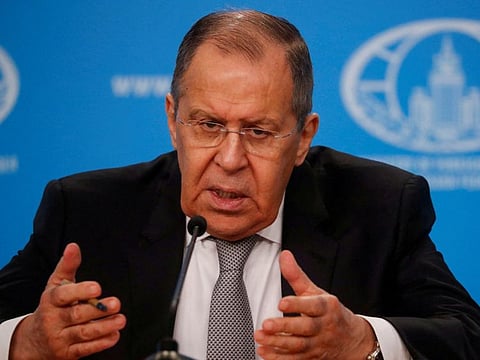Kremlin sees Iran nuclear deal in sight as Beijing convenes talks
Russia’s optimism follows words of caution by Blinken who said weeks left to save accord

Moscow: The Kremlin’s top diplomat said he expects world powers will salvage the landmark accord limiting Iran’s nuclear activities in exchange for sanctions relief as the latest round of talks grinds on.
The comments by Russian Foreign Minister Sergei Lavrov came as his Iranian counterpart meets officials in China, which has hosted a series of meetings this week with top Middle East envoys to discuss regional security and economic cooperation.
The eighth round of negotiations to reboot the 2015 nuclear accord - scuttled almost four years ago by the Trump administration - is concluding its third week in Vienna.
“There’s real progress,” Lavrov told reporters on Friday in Moscow. “We are expecting an agreement to be reached.”
Russia’s optimism followed words of caution by US Secretary of State Antony Blinken on Thursday, when he told National Public Radio in an interview that just weeks remain for sides to reach an accord.
There are only “a few weeks left” to save the Iran nuclear deal, and the United States is ready to look at “other options” if negotiations fail, Secretary of State Antony Blinken said on Thursday.
Talks to restore the 2015 accord between Tehran and world powers - United States, France, Britain, Russia, China, and Germany - began last year but stopped in June as Iran elected ultraconservative President Ebrahim Raisi.
The talks resumed in November.
“We have, I think, a few weeks left to see if we can get back to mutual compliance,” Blinken said in an interview with US public radio station NPR.
“We’re very, very short on time,” because “Iran is getting closer and closer to the point where they could produce on very, very short order enough fissile material for a nuclear weapon,” he said.
According to the top US diplomat, Tehran has made nuclear advances that “will become increasingly hard to reverse because they’re learning things, they’re doing new things as a result of having broken out of their constraints under the agreement.”
The 2015 deal offered Iran much-needed relief from sanctions that have crippled its economy, in return for curbs on its nuclear programme.
But then-US president Donald Trump’s unilateral withdrawal from the deal in 2018 prompted Tehran to walk back on its commitments.
Trump’s successor Joe Biden has backed a return, with Washington indirectly taking part in the European-brokered negotiations on reviving the so-called Joint Comprehensive Plan of Action (JCPOA).
Reviving the accord “would be the best result for America’s security,” said Blinken. “But if we can’t, we are looking at other steps, other options” with allies including in Europe and the Middle East.
The other options have been “the subject of intense work as well in the past weeks and months,” he said. “We’re prepared for either course.”
US officials have suggested Iran’s rapidly expanding uranium-enrichment programme could soon render the accord obsolete.
Chinese officials, meanwhile, invited Iranian Foreign Minister Hossein Amirabdollahian to a meeting on Friday to discuss “strategic issues,” according to Iran’s state-run Press TV.
Among the topics being discussed with Chinese Foreign Minister Wang Yi is a 25-year bilateral agreement designed to enable billions of dollars of investment in the Persian Gulf country.
Some analysts have named China the key player that will decide the outcome of the nuclear talks, which also involve France, Germany and the UK Beijing’s deepening cooperation with Tehran in the face of US sanctions has given the Islamic Republic’s government an economic escape route.
China remains a key customer of Iranian oil, with it imports of crude from both Iran and Venezuela - also heavily sanctioned by Washington - reaching a three-year high in 2021. The talks in Beijing with Iran follow a visit by Saudi Arabian Foreign Minister Faisal bin Farhan Al-Saud this week, suggesting China is looking to raise its diplomatic profile in the oil-rich region.
Tehran and Riyadh have recently vowed to work toward re-establishing diplomatic ties and reopening their embassies, which have been shuttered for the past seven years. Last month in Vienna, China said it wanted to increase its role in rejuvenating the nuclear accord.


